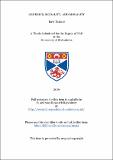Generics, modality, and morality
View/
Date
04/12/2019Author
Supervisor
Funder
Keywords
Metadata
Show full item recordAltmetrics Handle Statistics
Altmetrics DOI Statistics
Abstract
The issues in this dissertation reside at the intersections of, and relationships between,
topics concerning the meaning of generic generalizations, natural language modality,
the nature and role of moral principles, and the place of supererogation in the overall
structure of the normative domain. In ’Generics and Weak Necessity’, I argue
that generics—exception-granting generalizations such as ’Birds fly’ and ’Tigers are
striped’—involve a covert weak necessity modal at logical form. I argue that this improves
our understanding of the variability and diversity of generics. This chapter
also argues that we can account for variability concerning normative generics within
a modal approach to generics. In ’The Genericity of Moral Principles’, I provide evidence
for the view that moral principles are generic generalizations, and, on the basis
of this claim, argue that moral principles do not provide adequate support for reasoning
about the moral statuses of particular cases. In ’Supererogation and the Structure
of the Normative Domain’, I investigate the diversity of the central normative modal
notions and argue that we should distinguish between two senses of supererogation
based different ways deontic modals are sensitive to background information.
Type
Thesis, PhD Doctor of Philosophy
Collections
Items in the St Andrews Research Repository are protected by copyright, with all rights reserved, unless otherwise indicated.

